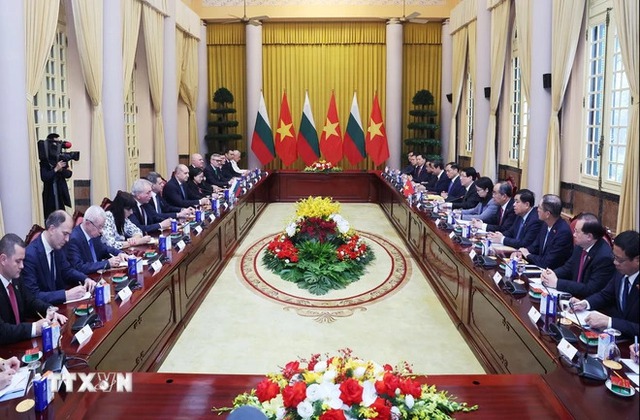Vietnamese, Bulgarian Presidents hold talks in Ha Noi
VGP - President Luong Cuong on Monday held talks with his Bulgarian counterpart Rumen Radev who is paying a five-day official visit to Viet Nam.

President Luong Cuong holds talks with his Bulgarian counterpart Rumen Radev in Ha Noi, November 25, 2024 - Photo: VNA
At the talks, the Vietnamese State leader reiterated that Viet Nam always places importance on and seeks to strengthen cooperation with Bulgaria, a priority partner in the Central and Eastern Europe region.
He took the occasion to express thanks to Bulgaria for being one of the first EU member states to ratify the EU-Viet Nam Investment Protection Agreement (EVIPA).
Luong suggested Bulgaria push for prompt ratification of the EVIPA by other EU member countries and removal of the "yellow card" warning on Viet Nam's seafood exports by the European Commission (EC).
Radev, for his part, affirmed that Bulgaria considers Viet Nam as a crucial partner in the Southeast Asia and expects to bolster stronger ties with the nation across all sectors, adding that Bulgaria stands ready to serve as a bridge for Viet Nam to enter the EU market.
The two countries need to step up collaboration in traditional areas such as defense and security, education and training, science and technology, agriculture, culture and sports, tourism, and people-to-people exchanges, while also expanding cooperation in newly-emerging areas such as digital transformation, information technology, mineral processing, and environment, he proposed.
Both leaders agreed to continue increasing contacts and exchanges of delegations at all levels and via all channels to further consolidate political trust and mutual understanding, thus solidifying the foundation for fostering bilateral cooperation in all fields.
They emphasized the importance of trade and investment ties, regarding it as an important pillar in the bilateral ties.
The host and the guest occurred to promote existing cooperation mechanisms such as the Intergovernmental Commission for Trade, Economic, Scientific and Technological Cooperation and encourage their ministries, localities, and enterprises to fruitfully tap the opportunities from the EU-Viet Nam Free Trade Agreement (EVFTA).
Both sides consented to facilitate the issuance of visas for citizens of both countries and promote local-to-local cooperation through trade, investment and tourism promotion activities.
Regarding regional and international issues of mutual concern, including the East Sea issue, both sides held that disputes and conflicts around the world should be resolved through peaceful means, based on the fundamental principles of the United Nations Charter and international law, especially the 1982 United Nations Convention on the Law of the Sea (UNCLOS 1982), contributing to maintaining peace, stability, security, safety, and freedom of navigation and overflight in the region and the world, for global cooperation and prosperity.
Following the talks, a joint statement was issued, reaffirming the commitments of both leaders to strengthen cooperation in areas where both sides have advantages, for the interests of their peoples, and for peace, stability, and sustainable development in each region and the world./.

